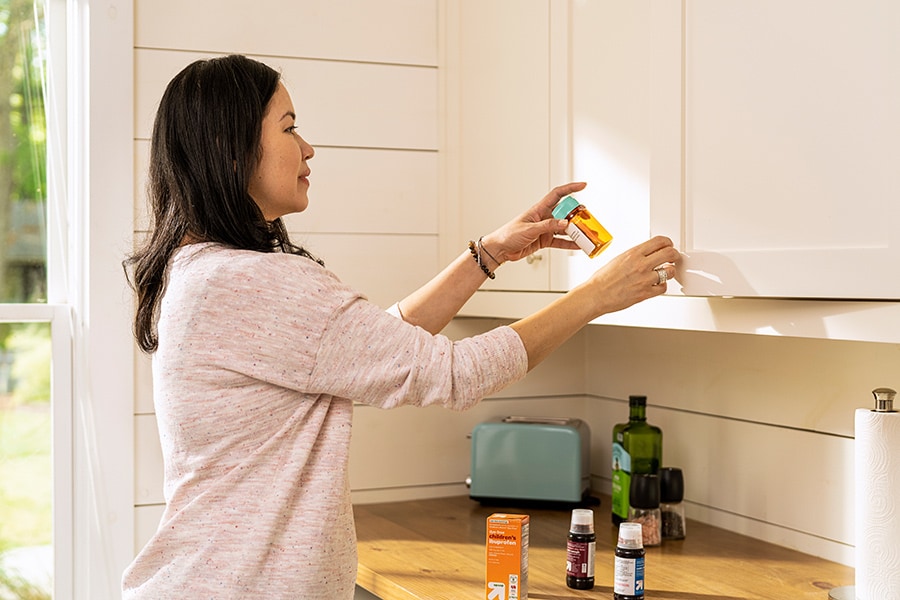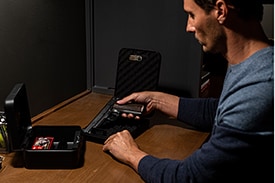Medication Safety and Storage Tips

Every 9 minutes in the U.S., a child is treated in an emergency department for medicinal poisoning. In many cases, a curious child got into medication while a caregiver wasn't looking, or the child was given a higher dosage than what was prescribed. Either way, these mistakes can be dangerous (or even deadly), and our safety experts want caregivers to be aware of medication risks and to know how to safely store medications away from children.
In this article:
How to safely store medications
Store medications out of sight and out of reach
It’s normal for kids to be curious and find things they’re not supposed to. That’s why storing medications in easy-to-reach or accessible places can be so harmful. According to a report from safekids.org, there several places kids and teens commonly find medicines, including in pillboxes, on the ground, inside a purse or diaper bag, on reachable counters and cabinets, or in the refrigerator. While some common over-the-counter medicines—like acetaminophen (Tylenol), ibuprofen (Motrin) or Children’s diphenhydramine (Benadryl)— have safety caps on them, they’re not child-proof.
The best thing you can do is store over the counter and prescription medicines out of reach (preferably high up) and out of sight.
Here are some additional tips for safely storing medications: 
- Keep all medications in their original packages.
- Store medication in a small lockbox or safe.
- Place medications back in safe storage immediately after using them.
- Never leave medication out in an area with a child. If you must step away, take the medication with you.
- Talk about how to safely store medication with other grown-ups who spend time around your kids (e.g., grandparents, friends, loved ones and babysitters) to help prevent them from making medication accessible.
- Dispose of unused or expired medications at healthcare facilities, local “take back” programs or your nearest drug disposal location.
- Store products you might not think of as medication, such as vitamins, diaper rash creams or eye drops.

How to safely administer medications
Each year in the U.S., more than 30,000 young children are treated at emergency departments after getting into medicines on their own or after dosing mistakes by adults.
Over-the-counter medication and prescription dosage are based on a child's weight. So, the amount your child took last year might not be the same as what they need now. Before giving your child medicine, double-check the label or any instructions from your child’s healthcare provider.
Here are some more safety tips from our Children's experts:
- Use the appropriate dosage tool, whether a cup with an OTC medication, or a syringe-like tool, to provide the most accurate dosage to your child. Do not use a kitchen spoon for a tablespoon or teaspoon measurement because spoon sizes vary and can cause errors in dosing.
- Share clear instructions with caregivers about your child's medication, including specifics on dosages and frequency.
- Never refer to medicine as consuming “candy.” This could be confusing to a child, which could tempt them to try other medications.
- Let your child know that only a trusted adult should give them medicine and that they should never take medicine on their own.
- Read your child's medication, drug facts and prescription labels thoroughly—especially over-the-counter medication. As your child becomes more independent, make sure they learn how to read and understand the label before taking medicine
- Stress the importance of responsible medication behavior.
For pre-teens and teens ages 11 and older:
- Encourage pre-teens and teens to read labels and drug facts for over-the-counter medications and prescriptions before taking them. (And to make sure they’re taking the right medicine!)
- Stress the importance of only taking medicine that is designed to treat their illness or symptoms, and to only take medication meant for them. Medication should never be shared with others.
- Talk to your teen regularly about the medication they are taking and how to take it responsibly. Share that medicine labels are rules, rather than guidelines.
- Make sure your teen follows the recommended dosage and knows that taking more than the recommended dosage at a time could do more harm than good.
What should I do if there's a medication error?
Immediately call the poison control center at 1-800-222-1222 if you believe a child may have gotten into medicine or vitamin or for any unintentional medication overdoses. They can provide guidance, including whether your child can be safely managed at home or needs to go to the emergency department.
If instructed to go to the emergency department, try to bring the product your child ingested with you.







